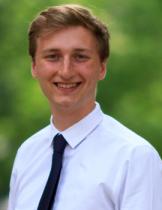
Building evidence, advancing policy, and impacting lives at the state and local level
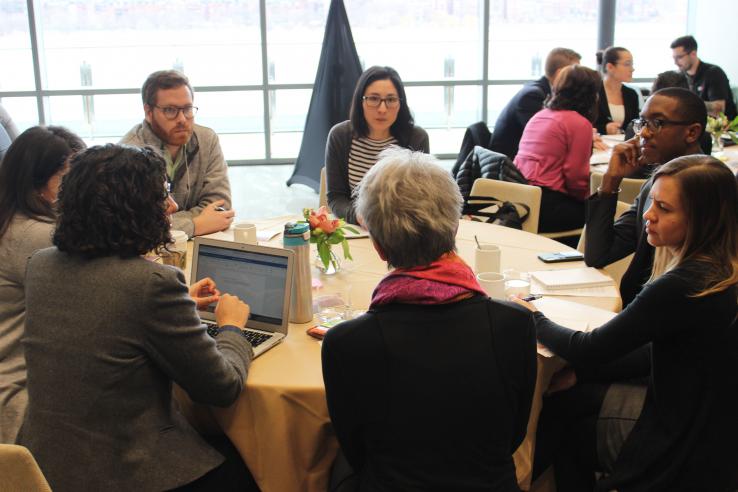
Across the United States there has been growing interest among city, county, and state governments to partner with researchers to generate high-quality evidence to inform important policy decisions.
In February 2019, J-PAL North America hosted Building Evidence, Advancing Policy, Impacting Lives, the third annual convening of J-PAL’s State and Local Innovation Initiative, to bring government leaders together on MIT’s campus. Together with academic researchers, funders, and research organizations, these state and local government officials are building a community dedicated to using randomized evaluations to inform policies and ultimately improve the lives of the people they serve.
Sharing ideas
The City of South Bend, Indiana is one such government leader whose work was featured at the J-PAL North America convening. Sonja Karnovsky, economic empowerment specialist at the City of South Bend, discussed a randomized evaluation of the Jobs for America’s Graduates (JAG) Multi-Year Dropout Prevention Program that the City of South Bend is planning in partnership with the Wilson Sheehan Lab for Economic Opportunities at the University of Notre Dame and the Northern Indiana Workforce Board. This evaluation seeks to identify the program’s impact on education and labor market outcomes.
“We are very interested in this evaluation because it will be the first time we collect specific information on the impact of the JAG program for South Bend students,” said Ms. Karnovsky during a breakout session for workshopping evaluation designs. “We know there are many students who meet eligibility criteria for the JAG program who do not currently receive services, either due to logistical or financial barriers. We would really like to understand the impact that JAG has on students and potentially use this information to make the case for expanding the program.”
The City of South Bend was one of eight state and local governments that presented on randomized evaluations currently under development. The gathering of leaders in evidence-based policy provided a unique opportunity for these leaders to receive feedback on their plans for evaluation from other research and policy experts.
Strengthening partnerships and establishing trust
The Dropout Prevention Program in South Bend is just one of many innovative approaches that state and local leaders are testing to improve the lives of the people they serve. Across four panels over two days, speakers shared examples of how they have invested in policymaker-researcher partnerships aimed at generating high-quality evidence on important questions.
In Boston, Alicia Sasser Modestino, an associate professor of economics at Northeastern University, has partnered with the city to evaluate the impact of the city’s youth summer jobs program. An initial evaluation demonstrated that the program reduced violent crime and increased participants’ social skills and professional aspirations.
During a panel entitled "Investing in Human Capital: What Have we Learned About What Works?" (watch the video), Professor Sasser Modestino shared how working with the City of Boston to develop surveys and launch an initial evaluation helped establish trust and laid the groundwork for subsequent evaluations that can inform how to optimize the program’s impact.
“What we’re really studying now are the program features,” Professor Sasser Modestino said when asked about what’s next for research on summer jobs programs. “For example, there’s a desire to grow better jobs. We think that those private sector jobs lead to better opportunities, but we don’t really know that… So now we’re getting to the exciting, really interesting part.”
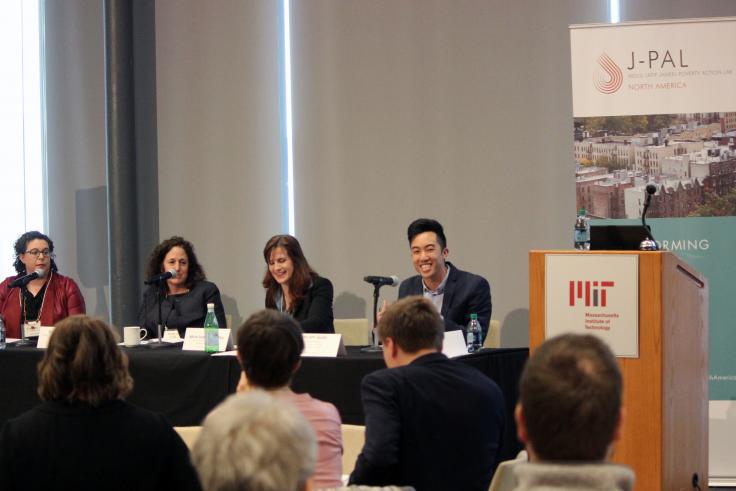
Panelists discuss how they have partnered with state and local governments to test questions related to school choice, parental engagement, and summer jobs programs.
The evaluation in Boston is one of several ongoing evaluations of summer jobs programs across the country. Together, they have the potential to contribute new insights. For example, the City of Philadelphia Mayor’s Office and J-PAL affiliate Sara Heller are partnering with J-PAL North America through the State and Local Innovation Initiative to study how the city’s summer jobs program impacts students’ academic achievement, future employment, and other social outcomes like substance abuse and rates of teen pregnancy.
Communicating evidence and influencing policy
A key question that emerged across the convening is how to communicate research results to produce timely and meaningful policy impact.
In a panel entitled "Turning Evidence into a Compelling Story: How to Communicate Research Findings to Enable Policy Change" (watch the video), David Yokum, adjunct associate professor at Brown University and former director of The Lab @ DC, shared his experiences disseminating the results from a randomized evaluation of the Metropolitan Policy Department’s body-worn camera program.
“For the body-worn camera study, we did have a technical paper of course, but we also had a website and did about 20 or so different community events, held with chiefs of police and police unions, the ACLU and Black Lives Matter, [and] high schools and various libraries. We placed stories in the Washington Post and other media outlets, recorded a podcast, and really just tried to tell the story in many different places, because the ways in which people encounter information is quite variable."
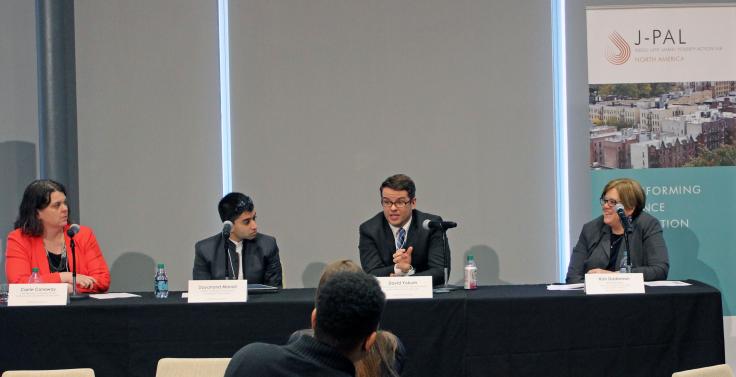
Panelists discuss their experiences bridging communications barriers between research and policy.
The Metropolitan Police Department study was one of many examples shared of efforts to bridge the policy and research worlds by making research more policy-relevant and by embedding rigorous evaluation and evidence into policymaking. In a panel entitled "Perspectives on Scaling Up" (watch the video), panelists detailed how they paired research with practice to bring effective programs to scale in contexts beyond those of the original study or studies.
A call for more researcher-policymaker partnerships
The participants at Building Evidence, Advancing Policy, Impacting Lives demonstrate how governments and researchers can form mutually beneficial, long-term partnerships. Together, academic researchers, policymakers, funders, and research organizations can advance evidence-based policies that stand to improve the lives of the people they serve, and in particular those living in poverty.
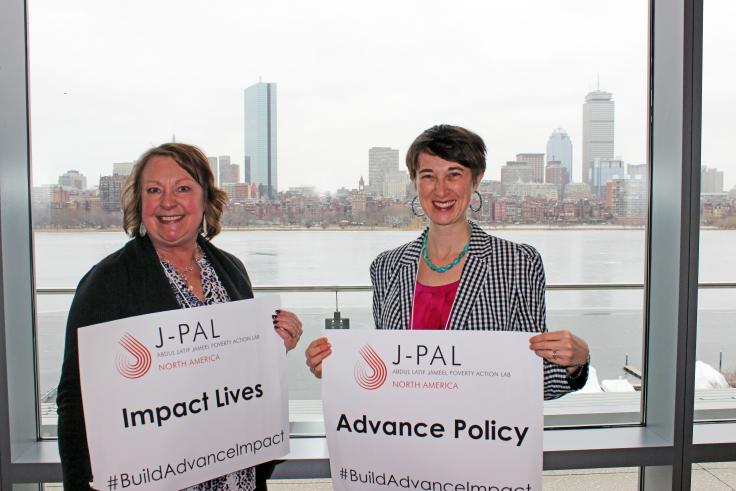
Terri Smith of the Metropolitan Council Housing and Redevelopment Authority and Alyssa Erickson of the Minneapolis Public Housing Authority highlight the convening’s theme to “Build Evidence, Advance Policy, and Impact Lives.”
The J-PAL North America State and Local Innovation Initiative is now accepting letters of interest from state and local governments that are interested in developing randomized evaluations to test policy-relevant questions. See the Initiative website to learn more about this opportunity.
Government representatives, researchers, and others can also sign up to receive State and Local Innovation Initiative updates, including research results, upcoming events and webinars, and partnership opportunities.
For additional event details and videos of each speaker from the conference, visit our event page.
